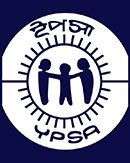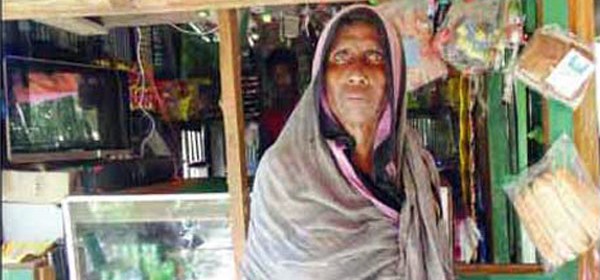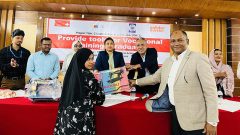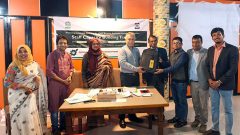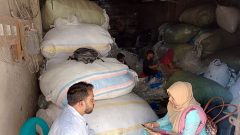Bibi Amena has been living in a village Bakkhali located at Syayadpur union of Sitakund Upazila under Chittagong district in Bangladesh. When Amena was only 13 years old, she got married to Abul Bashar who was living in the same village. She was being neglected and tortured by her mother in law since she was totally unaware about the domestic life or family affairs. She gave birth to a child at the age of 15 and the second child at the age of 17. Her husband was a farmer and he was managing his family together with their children adequately from the farm income. They had hopes and dreams.
Meanwhile, Amena’s mother in law had died. What a terrible irony, some days later, her husband had died from heart disease leaving her a widow. They hoped they would have a bright future with their two sons. However, the only earner of her family was Abul Bashar. He used to bear all expenses of his family. He kept no cash at the time of death.
Amena desired that her eldest son would steer the family and remove pain and sorrow from their life. But there was no luck.
Bibi Amena had gone door to door from village to village looking for a job to survive. She did not get a job. In fact, she was neglected and disrespected. Despite her aspiration of doing a business, it was not possible to start a business due to a lack of capital. Thereafter, she started selling arum leaves collecting from the roadside and abandoned field. But she faced great difficulties to manage domestic life with this little income. At that time her youngest son took a job at a tea stall. But it was not sufficient to get rid of the family crisis. She began to go from door to door for food. Finding the no way out, she chose begging as she had to survive in some way. Thus, she was living a hard life.
One day, she met Mahabub Alam who is a development activist working at YPSA. After seeing tears and dream in her eyes, Mahabub wanted to know about her aspiration. She told him that she does not like begging. She wants to live with respect and dignity. She wanted that no one would ever treat her sons as son of a beggar. She also told Mahabub that if someone could provide a small grocery shop in front of her house, she would give up begging. Later on, Mahabub brought her to Didarul Alam, coordinator of YPSA’s ENRICH project. Amena shared everything including her dream. After getting commitment that she would quit begging, Didarul Alam made an arrangement for building a small grocery store supplied with consumer goods for sale. The shop was provided to Amena under the project “Enhancing Resources and Increasing Capacities of Poor Households Towards Elimination of their Poverty (ENRICH)” implemented by YPSA and supported by Palli Karma-Sahayak Foundation (PKSF).
After one month later, Amina brought her son from the tea stall where he was serving for a tiny income. Her son is now running the shop. Amena has started peddling goods from village to village. Now she has become a businesswoman. Last three months, she made a good income from the grocery shop and peddling. She deposited money into her bank account from her earnings. Not only that, she has bought a goat with its three kids from the market with a coast of 8300 Taka. She has bought a color television. There was no electricity line at the Amenas’s house earlier, now light bulb is illuminating her house and shop at night.
Presently, community people treat Amena and her son as businessperson. She is living her best life with respect and dignity in the society.
If wealthy people come forward to help oppressed and disadvantaged people like Amena, poverty would be reduced from the society as the civil society asserted.
